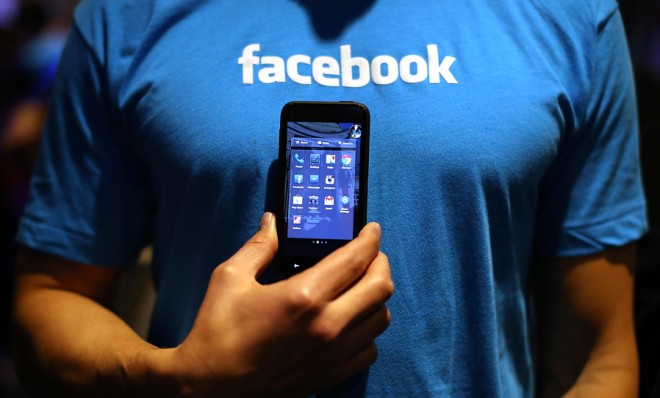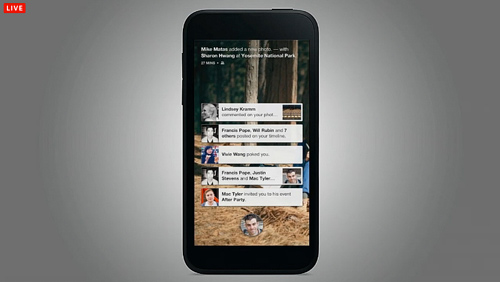Why Facebook Home is a huge win for Android
At first glance, Google shouldn't be happy. But...

A free daily email with the biggest news stories of the day – and the best features from TheWeek.com
You are now subscribed
Your newsletter sign-up was successful
On Thursday, Mark Zuckerberg and a cast of Facebook engineers announced a new phone called the HTC First. It has a 4.3-inch screen, LTE compatibility, and is just $99 with a two-year contract on AT&T. By all accounts, it's a solid, nice phone most people would be perfectly fine with owning.
But the long-awaited Facebook Phone that we all thought was a silly idea wasn't even the biggest news of the day. It was merely an asterisk tacked onto something that we haven't really seen before. It's called Home.
Home isn't an app, or an operating system. Rather, it's an attractive new layering piece that takes some mighty big liberties with Android's "open" platform. As Zuckerberg said, Home is a user interface designed to put "people first" — with people, of course, meaning Facebook. (Take a visual tour of Home here.)
The Week
Escape your echo chamber. Get the facts behind the news, plus analysis from multiple perspectives.

Sign up for The Week's Free Newsletters
From our morning news briefing to a weekly Good News Newsletter, get the best of The Week delivered directly to your inbox.
From our morning news briefing to a weekly Good News Newsletter, get the best of The Week delivered directly to your inbox.

When you install Home on your Android, your lock screen is replaced with big pictures posted by your FB friends. Notifications float in and out, and arrange themselves algorithmically based on importance. Messages are re-imagined as something truly innovative called Chatheads, in which texts and FB messages fluidly converge, allowing you to communicate across different platforms without changing apps. Your pre-existing applications are hidden behind a curtain. Navigation is easy and gesture-based. It's a pretty, intuitive, and an incredibly bold new vision for mobile computing.
At first glance, Facebook Home would appear to be a huge headache for Google, which competes with Facebook on more than a few levels. The New Yorker's Matt Buchanan says it "exploits the open architecture of Google's Android operating system." The Verge's Nilay Patel put it another way:
But surely Google saw this coming? Remember: Facebook isn't even the first big-name tech company to seize on Android's openness — that distinction belongs to Amazon and the Kindle Fire. Openness is "central to Google's Android strategy," says Farhad Manjoo at Slate. "Google gives away Android to phone-makers for free in an effort to boost worldwide adoption." And reaching a lot of people around the world is something Facebook knows a thing or two about.
Plus, Facebook may just solve "one of Android's biggest problems," argues Manjoo: Its "fragmented" ecosystem that causes different Androids to "look and work a little differently (and usually, not very well)." Although Home will only work on the HTC First and "good" Android phones like the HTC One and Samsung's Galaxy S series, it isn't a stretch to imagine Facebook's UI becoming a baseline option for all entry-level Androids within a year or two as they continue to improve.
A free daily email with the biggest news stories of the day – and the best features from TheWeek.com
In essence, Facebook has designed a beautiful new interface that (1) may snare new users into the Android ecosystem, and (2) doesn't interfere with Google's ability to sell apps and media in the Google Play store. Sure, Zuckerberg said that the plan is to eventually use Home to showcase Facebook ads. But the home screen isn't where Android makes its money. Facebook Home is just a pretty billboard; Google Play is the actual business.
Will Home be for everybody? Probably not. But if even a modest fraction of Facebook's billion-plus users choose it as their primary portal into mobile, you can bet Mark Zuckerberg will be a very happy camper. And, by extension, so will Google.
-
 ‘My donation felt like a rejection of the day’s politics’
‘My donation felt like a rejection of the day’s politics’Instant Opinion Opinion, comment and editorials of the day
-
 Trump wants a weaker dollar but economists aren’t so sure
Trump wants a weaker dollar but economists aren’t so sureTalking Points A weaker dollar can make imports more expensive but also boost gold
-
 Political cartoons for February 3
Political cartoons for February 3Cartoons Tuesday’s political cartoons include empty seats, the worst of the worst of bunnies, and more